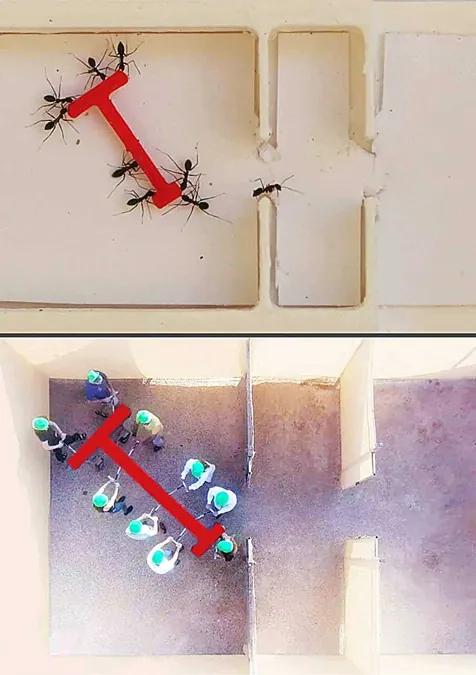
Ants Outsmart Humans in Group Problem-Solving Challenge!
2024-12-27
Author: Yan
Ants Outsmart Humans in Group Problem-Solving Challenge!
In a stunning revelation, a new study has thrown a wrench into the long-held belief that humans are the smartest creatures on Earth. Researchers conducted a fascinating experiment comparing the collective problem-solving abilities of ants to those of humans, utilizing a geometric puzzle known as the "piano-movers" task. This involved maneuvering a T-shaped load through a maze-like environment, testing the cognitive strategies of both species.
The star players of the study were longhorn crazy ants, a species renowned for its exceptional cooperation skills. Their nickname "crazy" stems from their frenzied movements, yet this behavior does not hinder their performance in complex tasks.
The Piano-Movers Challenge
The piano-movers challenge is a classic test that examines problem-solving prowess and teamwork. Participants are required to navigate a piano (or, in this experiment, the T-shaped load) through tightly spaced chambers connected by narrow openings. This task demands not just spatial reasoning but also superb coordination to successfully traverse various obstacles while reaching a defined exit.
While human participants willingly tackled the puzzle, the ants perceived the load as food, which incentivized them to work together to transport it back to their nest. The researchers designed two distinct mazes—one for ants and one for humans—allowing for direct comparisons.
Group Dynamics: Ants vs. Humans
The ants were grouped in different sizes: individual ants, small groups of 7, and larger groups of 80. Similarly, human test subjects formed groups of varying sizes: one individual, a group of 6-9, and a larger crowd of 26. To add an interesting twist, some human participants had to solve the puzzle without speaking to each other, donning surgical masks and sunglasses to hinder non-verbal communication.
On an individual level, humans outperformed ants by employing their superior spatial reasoning to navigate the maze efficiently. However, everything changed in group settings. Ants outshone humans, leveraging their simple strategies effectively across larger groups. They demonstrated impressive collective memory skills, avoiding repeated mistakes and honing their tactics as they solved the puzzle together.
In stark contrast, human groups struggled. When stripped of communication—akin to how ants operate—humans performed worse than even solitary individuals. Their approach favored short-term solutions without considering long-term effectiveness, illustrating a significant downfall in collective problem-solving.
Superior Collective Intelligence of Ants
Remarkably, not only did groups of ants surpass individual ants in performance, but they also outperformed groups of humans in many instances.
As explained by Ofer Feinerman from the Weizmann Institute of Science, one of the study's co-authors, “An ant colony functions as a family unit. All the ants share genetic ties and common goals, creating a society where cooperation prevails over competition." This tightly woven community often acts as a "super-organism," a collective body where individual contributions culminate in superior outcomes.
Implications and Future Directions
The implications of this research are significant. It highlights contrasting evolutionary paths between the cognitive abilities of ants and humans. Ants have adapted to maximize group competence at the cost of individual intelligence, while humans have refined personal cognitive skills but find collective efficiency elusive.
Feinerman notes, “Our findings illustrate that ants, as a collective, demonstrate a form of intelligence greater than individual capabilities. Conversely, forming groups did not enhance the cognitive skills of humans.” The much-discussed notion of the "wisdom of the crowd," frequently touted in social media contexts, fell short in this experiment.
Looking forward, this research could pave the way for exciting new inquiries. Exploring collective cognition in other species may deepen our understanding of its evolutionary origins. Furthermore, scrutinizing human group dynamics across various cultures could yield dynamic strategies to enhance teamwork. Meanwhile, insights from ant behavior could inspire advancements in decentralized robotic systems—proving that sometimes, simplicity breeds the most profound solutions!
Stay tuned as we uncover further developments in the fascinating interplay of cooperation and intelligence across species!



 Brasil (PT)
Brasil (PT)
 Canada (EN)
Canada (EN)
 Chile (ES)
Chile (ES)
 España (ES)
España (ES)
 France (FR)
France (FR)
 Hong Kong (EN)
Hong Kong (EN)
 Italia (IT)
Italia (IT)
 日本 (JA)
日本 (JA)
 Magyarország (HU)
Magyarország (HU)
 Norge (NO)
Norge (NO)
 Polska (PL)
Polska (PL)
 Schweiz (DE)
Schweiz (DE)
 Singapore (EN)
Singapore (EN)
 Sverige (SV)
Sverige (SV)
 Suomi (FI)
Suomi (FI)
 Türkiye (TR)
Türkiye (TR)